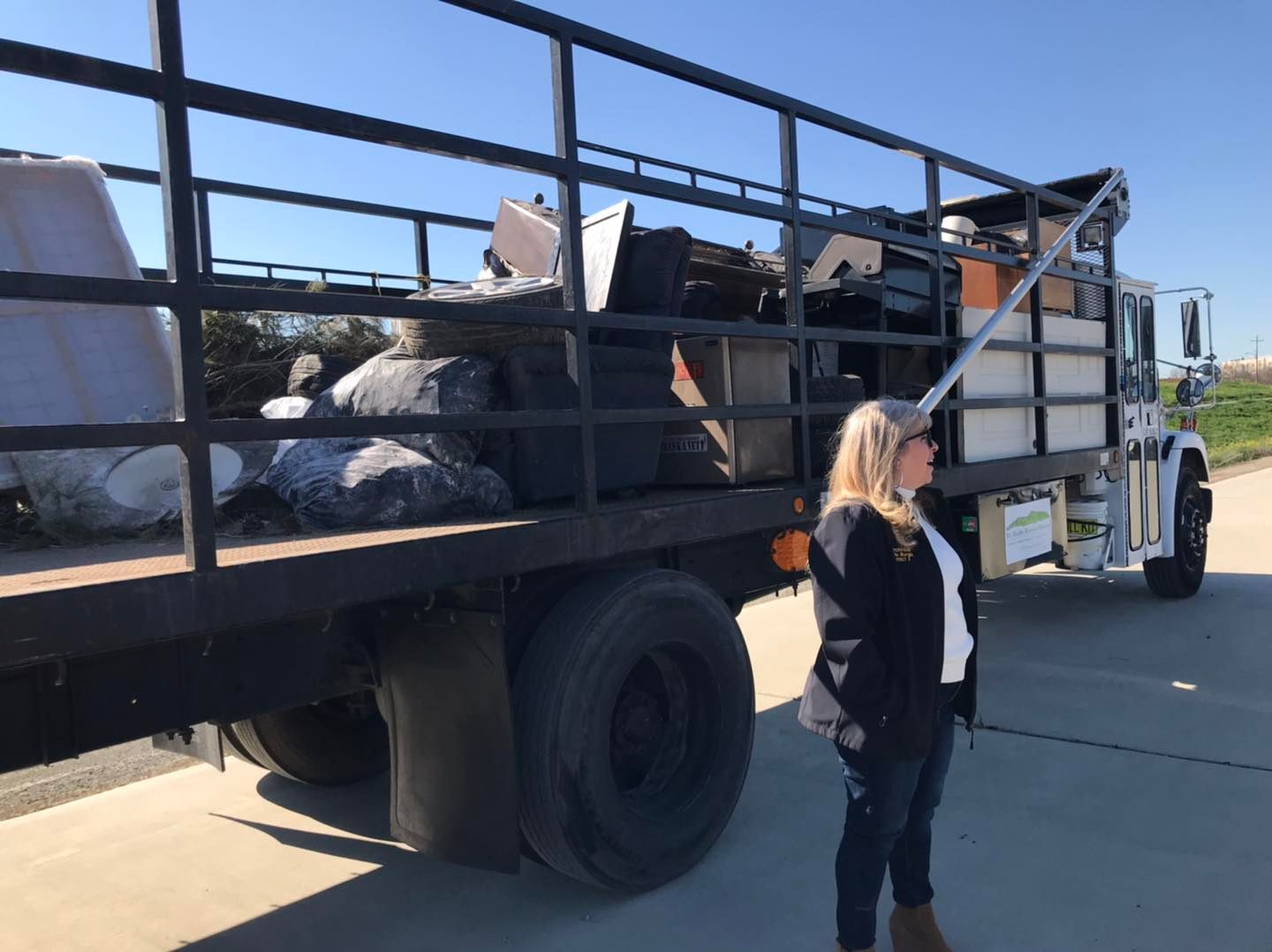
Supervisor Diane Burgis stand in front of a truck with nine yards of garbage illegally dumped on roads in the county during press conference in Antioch on Thursday, Feb. 17, 2022. Photo by Allen D. Payton
AB 2374 increases fines, adds teeth to state law on illegal dumping
At a press conference on Thursday, Feb. 17, 2022, in Antioch, Assemblywoman Rebecca Bauer-Kahan (AD16-D-Orinda), District 3 Supervisor Diane Burgis, the bill’s sponsor, and local county leaders announced the introduction of AB 2374. Entitled “Crimes against public health and safety: illegal dumping”, the bill was introduced in response to the rampant illegal dumping plaguing communities across California.
“The illegal dumping of trash, furniture, mattresses, appliances, and toxic materials is out of control in both our rural and urban areas – it isn’t just unsightly, it is putting the health of our communities and environment at risk,” said Bauer-Kahan. “Every Californian deserves the right to live in clean, garbage-free neighborhoods.”
“We started this out when we were trying to figure out how to handle it. That’s when we learned of the multiple agencies each responding,” said Burgis. “We formed a Think Tank of agencies in the county, plus East Bay Regional Park and our garbage haulers. And it’s expensive.”
“What people were doing was instead of taking it to the landfill or transfer station, they were just dumping it on the side of the road,” she stated. Pointing to the truck filled with items picked up along East County roads that was at the press conference Burgis said, “That’s nine yards, but they usually pick up 15 yards of large and small items in East County, each week.”
This bill builds upon previous legislative efforts of Bauer-Kahan and Contra Costa and Alameda Counties in 2019. These efforts provided funding to the counties of Alameda and Contra Costa to establish a pilot program for additional enforcement of illegal dumping laws in both counties. This program has been successful, but more tools in the arsenal to fight illegal dumping are necessary. Policies like increased enforcement, street lighting, and cameras throughout the East Bay region have also helped, however, California still lacks sufficient penalties to deter people from this harmful behavior.
AB 2374 raises fines on illegal dumping of commercial quantities up to $5,000 upon first conviction, up to $10,000 on a second conviction, and up to $20,000 on third or subsequent conviction. Additionally, this bill will give judges discretion to require the convicted to pay for the removal of their illegal dumping, suspend the business license of any individual convicted of dumping waste connected to their business, and allow for that person’s name and name of the business to be publicly displayed as convicted of illegal dumping.
“We want everyone to be doing the right thing, but there’s a limit to what we can do to educate and incentivize good behavior,” said Burgis. “It’s important for the public to understand that dumping has an impact on the quality of our drinking water, and that it disproportionately impacts marginalized communities. I applaud Bauer-Kahan for her efforts to empower us with the tools we need at the local level to start getting greater control of this problem.”
Contra Costa County District 5 Supervisor Federal Glover, who also serves on the County’s Illegal Dumping Ad Hoc Committee, added, “Residents deserve beautiful land and clean neighborhoods to live and work in. We want to be sure that everyone, including commercial businesses, hear loud and clear that they cannot illegally dump in our community without hefty fines, hence the need for this legislation.”
“Illegal dumping is a plague on our entire state – impacting our most urban, suburban, and rural communities. In a pilot project in my Supervisorial District alone we’ve removed nearly 1,200 tons of trash from our streets. This legislation provides needed enforcement authority to combat illegal dumping and blight in our neighborhoods, while alleviating the unfair burden of clean up from residents and local businesses,” said Alameda County Supervisor and Board Vice President Nate Miley.
“By upping the fines and providing tools for the courts to publicly hold violators accountable for committing these acts, we disincentivize actors and create public knowledge on who not to work with,” Bauer-Kahan added. “I want to thank Contra Costa County for bringing this bill idea to my attention and look forward to getting it implemented statewide.”
Allen D. Payton contributed to this report.

